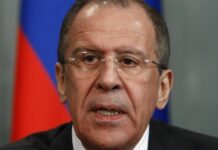A relatively new internet news site called Független Hírügynökség collected all the early responses to the rebuttal and the interview from pro-government sources and came to the conclusion that most of these slavish organs of government propaganda needed a few hours to recover from the shock.
George Soros, simultaneously with releasing his rebuttal of the Hungarian national consultation on the alleged Soros Plan, gave an interview to Andrew Byrne of The Financial Times, in which he explained his decision to break his silence. He cannot remain quiet any longer because the Hungarian government about a month ago announced its intention to investigate the so-called Soros network. Under these circumstances, he felt he had to “set the record straight in order to defend these groups and individuals who are going to great lengths to defend European values against persecution.” At the same time he urged EU countries to raise their voices against “Orbán’s treatment of civil society and address fears over the rule of law in Hungary.”
It is hard to know for sure whether this interview and rebuttal by George Soros came as a surprise to the Orbán government or not, but I suspect that it did. After all, the campaign against Soros has been going on for almost two years, yet Hungary’s benefactor hasn’t publicly criticized the Orbán government’s treatment of him and hasn’t come out in defense of the NGOs he has been supporting. During these two years he spoke out only once, thanking the 20,000-30,000 people who demonstrated on behalf of the beleaguered Central European University he founded. The devilish idea of a national consultation on the Soros Plan was born months ago, the questionnaires were sent to eight million voters more than a month ago, yet Soros said nothing. So, I assume Orbán believed that Soros would not engage verbally but would simply take all of the abuse showered on him and the employees of the civic organizations that have been the beneficiaries of his largesse.
A relatively new internet news site called Független Hírügynökség collected all the early responses to the rebuttal and the interview from pro-government sources and came to the conclusion that most of these slavish organs of government propaganda needed a few hours to recover from the shock. As is normally the case, these so-called journalists wait for the word from above. Once the government mantra is handed down, the “parrot commando” takes over. This time the magic phrase is “frontal attack.” It was Gergely Gulyás, the new Fidesz parliamentary whip, who got the assignment of sounding the trumpet. We can be assured that from this time on we will encounter the same phrase in all pro-government publications. According to Gulyás, George Soros until now has attacked Hungary and its government only “through organizations he finances, the European Parliament, and his Brussels allies,” but now he has personally joined the fight. He is attacking the government’s nationwide public survey, “making accusations, threats, and slanders.”
Gulyás, who has shed his gentlemanly demeanor since he became the Fidesz whip, wasn’t satisfied with criticizing Soros’s interview. Obviously he was told that he must announce that the investigation of the NGOs George Soros is worried about might be extended to Soros himself. Here is exactly what he said: “Civic organizations function freely in Hungary within a constitutional framework, but if there is an organized attempt at discrediting Hungary from abroad, this activity must be investigated.”
Let’s step back briefly to the Hungarian government’s “investigation” of the partially Soros-funded civic organizations. It was about a month ago that Viktor Orbán called these NGOs a threat to national security. Last week János Lázár announced that the government had asked Sándor Pintér, minister of the interior, to report on the possible dangers these civic groups pose to Hungary. This afternoon Pintér was to report to the parliamentary committee on national security about these alleged dangers. Before the hearing took place, Magyar Idők published an editorial which hypothesized that George Soros had timed his attack on Hungary in order “to divert attention from Pintér’s report” and “ahead of time to discredit it.” That sounded like a plausible theory, but to the obvious chagrin of the Orbán government, Pintér was unable to come up with any national security threats these human rights organizations present to Hungary. According to information that reached Index.hu, Pintér sidestepped the question. Obviously, he cannot go against the government’s position, but at the same time professionally he couldn’t find any national security risks stemming from these organizations’ activities. He apparently simply repeated what he had told the media a few days ago: “I don’t know whether George Soros poses any danger, but ideas he promulgates do not conform to the Hungarian conceptions and to Hungarian law. An open society, a society without borders are not accepted at the moment. They are futuristic.”
Yes, Soros stood up and fought, not so much for himself as for the people who as human rights activists are being threatened by the regime. Once he broke his silence he decided to go all the way. When RTL Klub asked for an interview, he sent a video message in Hungarian which the network immediately put up on its own website. It is a very moving video that lasts maybe two minutes. “It is a tragedy for Hungary that its present government is trying to keep itself in power by distorting reality and by misleading the population…. I’m terribly worried about Hungary; I think a lot about Hungary, and I want the Hungarian people to know that I will continue to do everything to support them.” It’s good to know that there are still people like George Soros around. The RTL Klub’s segment on Soros on its news program can be viewed here.
Balogh S. Éva (Hungarian Spectrum)


























